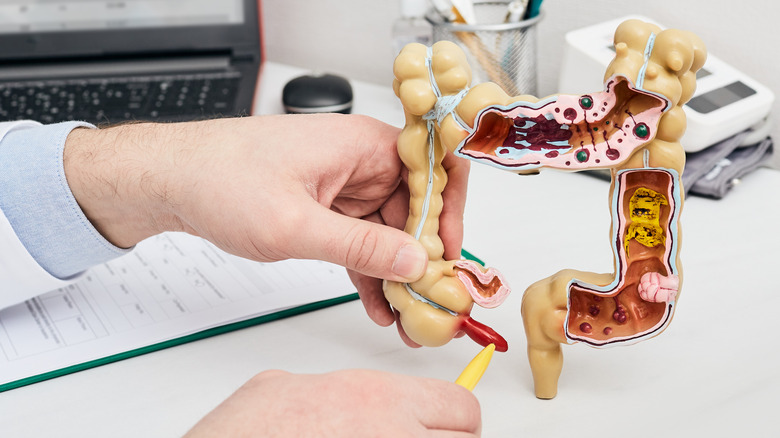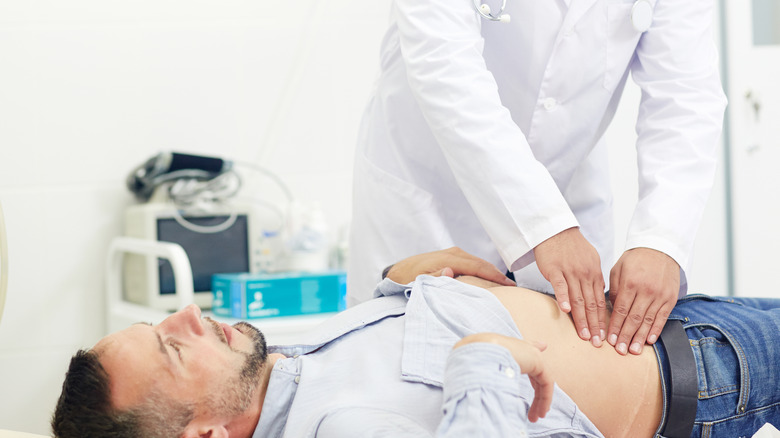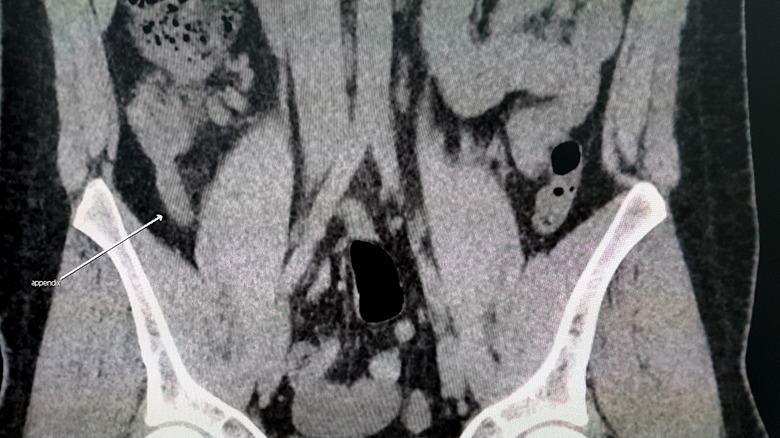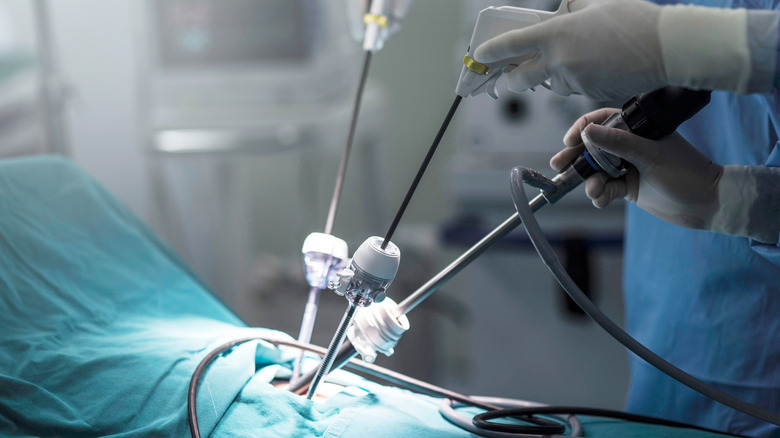Appendicitis Explained: Symptoms, Causes, And Treatments
Appendicitis occurs when the appendix becomes inflamed, blocked, or infected. There are numerous causes, some of which are more prevalent in certain age groups and genders. Although appendicitis occurs most frequently in people under 30, it can happen at any age (via Mayo Clinic).
This little organ may have gone unnoticed by you, but when it is aggravated by swelling or infection, it has the power to cause havoc in your body. An inflamed or infected appendix usually causes abdominal pain and symptoms that mimic various gastrointestinal illnesses. It may be difficult to distinguish between normal abdominal pain and abdominal pain caused by appendicitis. In addition, appendicitis is among the most common reasons why people undergo abdominal surgery, and is said to affect more than 5% of the American population (per Merck Manual).
Thus, it is important to know common symptoms, causes, and treatments if you are experiencing abdominal pain or if you suspect that you may have appendicitis.
What is an appendix, and why do you have one?
The appendix is a narrow tube in the lower right side of the abdomen that connects to the large intestine. It is part of your digestive system, but its function in the human body is still unclear (via Hawaii Pacific Health). The appendix is thought to aid in disease prevention in infants and children. However, the appendix is said to cease functioning in this manner as you age (via John Hopkins Medicine).
According to a 2013 study published in the American Society of Microbiology, this tiny reservoir might be useful for preserving healthy bacteria in the gastrointestinal tract until the body requires it. When the appendix retains healthy bacteria, it can assist the body with recovery after a stint of diarrhea, or even help avoid autoimmune diseases of the colon like Crohn's disease. Although the appendix may contain beneficial bacteria, it is not considered a vital organ for survival.
Early warning signs of appendicitis
It is easy to dismiss early signs of appendicitis. Some warning signs, such as bloating and gas, are less noticeable. However, as the following symptoms become more apparent, most people will realize something is wrong. Early symptoms vary according to age and may include mild abdominal pain that feels like gas. It is not uncommon for gas-related pain to hurt (via Healthline).
If no other symptom exists, you may try a gas relief medication and hope for the pain to subside. But if the pain intensifies or is accompanied by other symptoms, you should seek medical attention. Mild nausea and loss of appetite can also present in the early stages of appendicitis. Nausea is a common symptom of many other health concerns; therefore, you may brush it off as nothing serious. However, if you start to vomit and increased pain is associated, that could indicate your condition is more serious.
Appendicitis in young children and teens
Let's face it: Kids get sick a lot, especially in preschool or elementary school. It may be more challenging to detect early symptoms of appendicitis in children. The younger the child, the more difficult it may be for them to describe or explain what is happening. You may have a child who constantly complains about stomach aches or other minor issues, for example, which can lead you to dismiss their initial complaint.
According to a 2017 study published in Pediatrics, poor communication can result in a considerable delay in treatment for younger children with acute appendicitis. It could take many hours or even more than a day to identify acute symptoms in younger children, since they may exhibit more evasive signs and have difficulty expressing their feelings. Furthermore, when older children and teenagers are in pain or experiencing other symptoms, they can communicate more clearly, making it easier to determine when symptoms require medical attention.
If your child complains of abdominal pain that does not improve, worsens when they move, or is accompanied by other symptoms such as nausea, vomiting, and fever, you should contact your doctor (via Kids Health).
Adults and appendicitis: What are the symptoms?
Everyone reacts to pain and illness in their unique way. There is no such thing as a perfect cookie cutter example for any disease, but there are some common signs and symptoms to be aware of.
Adults with appendicitis typically experience subtle pain that may initially present in the mid to upper portion of the abdomen. As the appendix swells, symptoms will likely worsen and move to a more localized, sharp pain in the lower right portion of the abdomen (per Healthline). Movement or other uncontrollable reactions, such as sneezing or coughing, will worsen the pain from appendicitis. Adults may also experience nausea, fatigue, constipation, bloating, and fever, according to a 2019 study published in U.S. Pharmacist.
Adults are more sensitive to changes in their bodies than young children. On the other hand, some adults can be obstinate and try to ignore symptoms or endure the pain until it becomes a medical emergency. Seek medical attention as soon as you feel your symptoms are more severe than just a stomach ache to prevent any potential consequences that could be brought on by delaying treatment (via E Medicine Health).
Can you get appendicitis while pregnant?
The last thing a pregnant woman wants to worry about is being sick or having problems during the pregnancy. Fortunately, pregnancy-related appendicitis cases are pretty uncommon. According to the Western Journal of Emergency Medicine, most appendicitis cases happen during the second trimester of pregnancy. It is important to note, though, that appendicitis impacts pregnant women in less than 0.05% of pregnancies. Still, even with the low incidence, appendicitis is the most frequent non-obstetric surgical emergency for pregnant women, as noted in a 2017 study published in International Scholarly Research Notices.
It can be challenging to diagnose appendicitis during pregnancy due to the changes in the female body from the developing fetus, as well as symptoms that mirror typical pregnancy-type symptoms (via Healthline). Additionally, the diagnostic imaging approach must be performed differently to avoid exposing the fetus to unnecessary radiation.
The good news is that if emergency surgery is required when pregnant, it can be done safely for both the baby and the expectant mother, per the findings of a 2016 study.
Uncommon symptoms of appendicitis you should be aware of
Most people know that worsening abdominal pain is a common sign of appendicitis. However, did you know that some uncommon symptoms should be taken seriously?
A few days of feeling gassy and bloated are usually not a cause for concern, especially if you're on the go and your food choices aren't ideal. Don't ignore those symptoms if they persist for a few days without relief; it could indicate that your appendix is flaring up.
Changes in bowel patterns like diarrhea or constipation can be annoying, but you might also mistake them for an upset stomach, virus, or poor dietary choices. Even if that is the reason for the upset, if you notice mucus (slimy-looking stuff) in your stool, if pain persists for more than a few days, or if you develop a fever, it may be one of those uncommon signs of appendicitis. In such instances, you should be examined by a doctor (via Narayana Health).
What causes appendicitis and how you can prevent it
The exact cause of appendicitis and why it is more prevalent in certain age groups is not fully known. What is known is appendicitis develops when the lining of the appendix swells or becomes blocked. There are a variety of potential causes, including bacteria and viruses, that induce infection and inflammation. Furthermore, hardened stool may become lodged in the tiny appendage. Blockages caused by hardened stool are most common in people who have been constipated for a long time (via Merck Manual). According to Cleveland Clinic surgeon William O'Brien, MD, there are also sporadic cases in which parasites can cause appendicitis.
If you are concerned about developing appendicitis, you can take preventative measures such as eating a fiber-rich diet regularly. Fiber can help keep your bowels moving and prevent constipation. Even if you change your diet, there are no absolute ways to completely guarantee you will not develop appendicitis (via Healthline).
Why you should seek medical advice
Your body is unique to you. Therefore, you are the best person to advocate for yourself when anything feels off. You should seek medical attention as soon as you suspect you or your child may have more than infrequent stomach pain or gas. It's important to realize that appendicitis is a medical emergency that will not go away if left untreated. In fact, the longer you wait for a diagnosis, the more likely you are to experience complications and a lengthy hospital stay (via Dignity Health).
According to a 2018 study published in JAMA Surgery, increased healthcare utilization reduces the likelihood of complications and perforation significantly. Delays in prompt care can increase the risk of perforated appendicitis, particularly in children. As a result, promptly seeking medical attention or going to an emergency room can help you avoid further complications and treatments like peritonitis, long-term antibiotic use, inpatient hospitalization, and potential readmission to the hospital for post-op complications.
What to expect when diagnosing appendicitis
The method used to diagnose appendicitis is determined by several factors, including age, symptoms, and medical history. Your doctor will determine the best course of action. A physical exam, imaging studies, and lab work may be used to properly diagnose appendicitis and rule out other common causes of abdominal pain. If your pain is severe, you will likely be taken to an emergency room for quick evaluation and treatment.
Your doctor will ask a series of questions regarding your symptoms and perform a physical exam. During the exam, your doctor may check for specific obvious signs of appendicitis, such as the exact site of your pain, by pressing on your abdomen (via Dignity Health). Per Osmosis, McBurney's point is in the lower right quadrant of your abdomen. This is the most painful area when you have appendicitis. Surprisingly, the pain occurs after your doctor's hand relieves pressure. This is known as rebound tenderness, a common sign of appendicitis.
A complete blood count (CBC) and a complete metabolic panel (CMP) will most likely be performed, with a focus on your white blood cell count (WBC), electrolytes, and C-reactive protein (CRP). These blood tests can help with an accurate diagnosis by detecting signs of infection or inflammation. (via Healthline). To complete a thorough evaluation of your symptoms, imaging studies will be performed. The definitive imaging study for diagnosing appendicitis is a CT scan (via American Family Physician).
Are there different treatment options for appendicitis?
When it is determined that you have appendicitis, you will be referred to a general surgeon. Treatment options are dependent on whether your appendix has ruptured or is still intact. Your doctor may begin with antibiotics to see if that relieves symptoms and reduces swelling and infection. Treatment with antibiotics alone, on the other hand, is uncommon. As a result, you will most likely require surgical removal.
An appendectomy involves surgical removal of the appendix performed under general anesthesia, meaning you'll be asleep during the process. In a 2017 study published in JAMA Surgery, appendectomies are the most commonly performed emergency surgical procedures in the United States, with over 300,000 performed each year.
Many surgeries can be performed using a minimally invasive technique known as laparoscopic surgery. If your appendix has not ruptured, laparoscopic appendectomy is the standard removal method. Performed through three small incisions, it allows for quicker recovery. Some surgeons can perform a laparoscopic single incision surgery called a SILS appendectomy. Still, it is up to your surgeon to determine the safest approach for your situation (via Journal of Minimal Access Surgery). If your appendix is ruptured, complications may occur, and you may require an open appendectomy (or laparotomy). A larger incision is made over the right lower abdomen for this technique, allowing the surgeon to clean out the inside of your abdomen (via National Institute of Diabetes and Digestive and Kidney Diseases).
What are the risks of surgery?
Every surgical procedure involves some level of risk. Before the procedure, your surgeon and anesthesiologist will discuss the risks with you and address any concerns you may have. It is, however, beneficial to write down any questions or concerns you may have before the discussion to be prepared to make an informed decision. During the surgery, your anesthesia provider will administer medication and monitor your vital signs to keep you comfortable. Although uncommon, some patients may experience adverse side effects from the medication. It's important to discuss any allergies or previous complications you've had while under anesthesia with your anesthesia provider before your appendectomy.
The risks associated with the surgical procedure will be discussed with your surgeon. Bleeding, pain and infection are the most common risks. Before you consent to the procedure, the specifics will be discussed. Regardless of how frightening the risks appear, they are extremely rare and must be disclosed by your providers before they can care for you. Furthermore, the dangers of untreated appendicitis are increased if surgery is not performed.
Recovery after surgery
Your hospital recovery may vary depending on the surgical technique and whether you had a ruptured or burst appendix. You might be able to leave the hospital the same day if your appendix was intact and a laparoscopic procedure was performed. Your surgeon will want to ensure you have pain under control, can pee, and keep liquids down without vomiting before being discharged (via Journal of American College of Surgeons).
However, if your appendix ruptured, you might need to stay in the hospital for a few days to receive IV antibiotics. This is especially true if you underwent an open laparotomy or experienced an unanticipated surgical complication (via SCL Health).
Whether you are released from the hospital the same day or several days later, you will need to recover at home. Up to 4 weeks may pass before you are permitted to resume all your regular activities (per the American College of Surgeons). Throughout the recovery period, be patient with yourself. For the first few days, stick to bland, healthy foods. Pain relievers and anesthetics are hard on the body and increase constipation. Moving around as much as possible and drinking plenty of fluids should aid recovery. To help you stay regular, your surgeon may also prescribe a stool softener.
Don't avoid medical care, even if you dread the thought of it
Most people dread going to hospitals or emergency rooms. But if you believe you can avoid seeing a doctor during an acute appendicitis episode, think again. It will not go away unless you seek medical attention; in fact, it may worsen. Waiting to receive care increases your risk of serious complications, which could delay your recovery and lengthen your stay in the hospital — the place you didn't want to be in, to begin with.
Untreated appendicitis can rupture or burst. When this happens, your appendix is unable to control the infection, allowing it to spread throughout your body. If left untreated, you can develop sepsis, a serious life-threatening condition that may necessitate lengthy antibiotic treatments, numerous surgeries, and even a stay in the intensive care unit (via the National Institute of General Medical Sciences). Fortunately, these complications can be avoided if you receive prompt medical attention and effective treatment.














